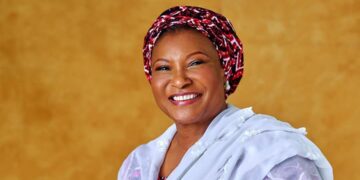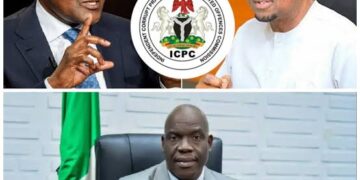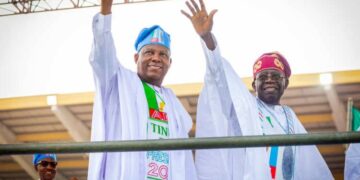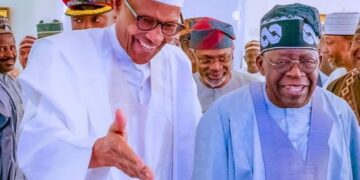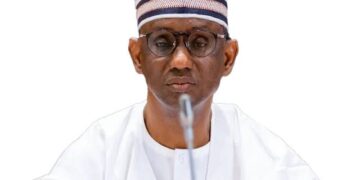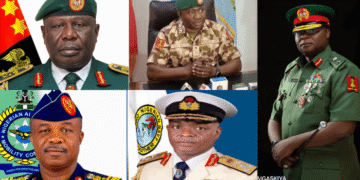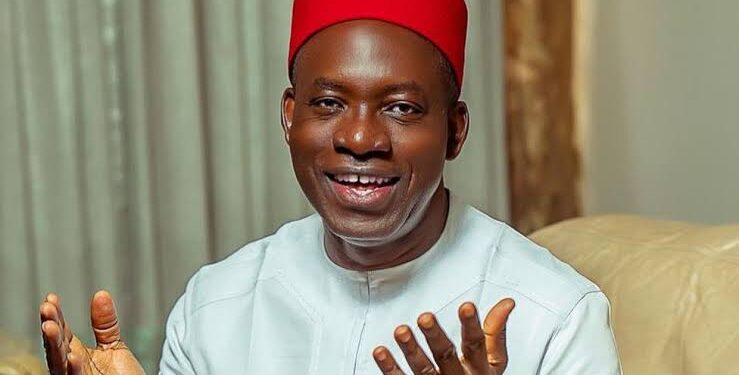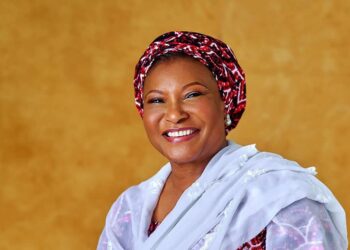By Ehichioya Ezomon
Saturday, November 8, 2025, is ‘Election Day’ in Anambra State, and the Independent National Electoral Commission (INEC) has declared that “all is set” for the governorship ballot in 5,718 of 5,720 polling units (two units are without registered voters), 326 wards in 21 local government areas, and 24,000 ad-hoc personnel to deploy statewide for a smooth conduct of the poll.
During a “readiness assessment visit” by a delegation from the INEC headquarters in Abuja, the National Commissioner supervising Anambra State, Dr. Kenneth Ikeagu, noted that as of Sunday, October 26, the commission had “achieved 99% operational preparedness” for the exercise, including:
• A mock accreditation on Saturday, October 25, to test the functionality of the Bimodal Voter Accreditation System (BVAS), which “performed optimally,” with “the process taking less than a minute per voter.”
• A Memoranda of Understanding (MoU) signed with transport unions and vehicle owners for timely and secure movement of election materials; and arrangement for boats to transport materials and personnel in riverine areas.
• Meetings with heads of security agencies, joined by officers from neighbouring states, who’ve pledged adequate personnel to reinforce security coverage across Anambra.
• Security agencies’ successful recovery and stabilisation of areas once threatened by insecurity, including Ihiala local government area, where “elections will take place in all polling units.”
• In case of persistent challenges, to have recourse to contingency arrangements, including the use of council area collation centres, to ensure that every eligible voter can cast their ballot.
As reported by Vanguard on Sunday, October 26, Ikeagu, praising the residents for their peaceful disposition ahead of the election, and urging registered voters to personally collect their Permanent Voter Cards (PVCs), as “collection by proxy is not allowed,” reminded them that “election is a shared responsibility,” and that every voter must take it seriously by collecting their PVCs.
With non-sensitive materials already deployed to INEC’s offices across the state, and sensitive materials scheduled for delivery 24 hours before the election, the INEC officials are expected, on poll day, to arrive at their polling units by 7:00 a.m. for the start of accreditation at 8:30 a.m.
Exuding confidence about INEC’s determination to deliver a seamless and credible franchise, Dr Ikeagu declared: “We came all the way from Abuja to conduct what is called a readiness assessment for the gubernatorial election. We held meetings with critical stakeholders, monitored the distribution of Permanent Voter Cards, and we are satisfied with the level of preparedness. We are ready for the election.”
Are the parties and their candidates also ready for the poll? Yes, they’re on paper, and on social media! But offline and on the ground, many aren’t prepared for the task aimed at unseating the incumbent and former Governor of Central Bank of Nigeria (CBN), Prof. Chukwuma Soludo.
So, six days to the poll, what do we see in the opposition camp? Engagement in rhetoric and bandying of allegations of how Soludo plans to rig himself in, thus preparing grounds to query the outcome of the poll they’re not likely to win due to inadequate preparation; poor mobilisation of voters; lack of the numbers against a dominant APGA in Anambra; paucity of funds for the campaigns; and lagging in alleged inducement of voters.
In a deeply religious state of majorly Catholic and Anglican faiths, Soludo’s cast his campaign as “a divine project” (other candidates claim no less), even as he leaves nothing to chance, rallying in all parts of Anambra, and boasting that his All Progressives Grand Alliance (APGA) platform targets “winning all 5,720 polling units” in the state.
For instance on October 27, the governor, taking his message of “continuity and development” to Ajalli in Orumba North and Umunze in Orumba South local government areas, told the residents that his return to the communities “feels like a homecoming” owing to their massive support for his first-term election, reports WazobiaReporters on Monday, October 27.
Soludo, who met with traditional leaders, community groups, and supporters, and described his campaign as a people-driven movement, with an “unprecedented level of community involvement and support for the APGA,” listed his government’s ongoing projects in Orumba, and pledged that the next four years “will focus on consolidating these gains and driving rapid development in every local government area.”
As a show of “strong support” for his re-election, the Orumba North and Orumba South communities donated N75m and N150m, respectively, to the governor’s campaign, and also vowed their determination to deliver victory for the APGA in Saturday’s poll.
Obviously engaging in and encouraging “vote-buying” – a tactic he employed during the August bye-elections in 16 states – Soludo pledged to reward the three wards with the highest votes for the APGA in Orumba South (and perhaps in Anambra’s 326 wards) in the election.
Soludo’s words as he spoke at Umunze: “When we were campaigning for the Senate (bye-election), we knew we were going to win every ward in the South senatorial zone, but we still had some incentives. Any ward that APGA won received N1m, and we won all the wards in Orumba South.
“We promise each of these wards N1m, and next week (after the poll), we will redeem it. The ward that comes first will get N5m, the second N3m and the third N2m. That was the deal! For November 8 (poll), any ward that wins again will receive N1m, while the first three performing wards will get N5m, N2m and N1m, respectively.”
Opposition parties and their candidates have repeatedly accused Soludo of plotting to game the process by “calling for,” and receiving millions of donations from individuals, groups, and local government officials.
The most vociferous lately is the African Democratic Congress (ADC) – the platform for the Coalition of Opposition Politicians (COP) of “former this, ex-that” – which’s slammed Soludo for “engaging in voter inducement” because “he’s out of touch” with the Anambra electorate.
In a post on his X handle (@BolajiADC) on October 26, the ADC National Publicity Secretary, Mallam Bolaji Abdullahi, claimed that: “Only a sitting governor, who has run out of public goodwill, would so openly resort to cash for votes, in direct violation of Sections 121 and 127 of the Electoral Act, which criminalise voter inducement of any form. This is a new level of desperation, wrapped in impunity, and I hope that INEC is not pretending not to see it.”
Abdullahi’s alarm mimics the ADC governorship candidate, John Nwosu’s criticism of Soludo over reports of the alleged donations, saying: “Such donations raise real concerns about compliance with the Electoral Act, morality, and the rule of law. If cash-strapped local governments are donating millions to the governor’s campaign, that is a charade and a blatant display of official dishonesty.”
Besides, on October 28, the Founder and Chief Executive Officer of TAF Africa, Mr Jake Epelle, blasted Soludo over his reward-for-votes remark, which he described as “political rascality” that undermines democratic values while serving as a veiled form of vote-buying disguised as community empowerment.
Appearing on ARISE News, Epelle said: “Unfortunately, that’s very unfortunate. I would describe that, and everybody knows me, I speak my mind. It’s actually political rascality. That’s the only way I can describe it. Soludo should have known better; that’s not the kind of thing, information you put out there for your people. It’s nothing but an inducement that is wearing the cloak of bait with Naira. It shouldn’t have happened. He shouldn’t have done that.”
While Soludo’s under the radar, the law doesn’t preclude, but limit the amount individuals or groups can contribute to the campaign coffers of their parties and/or preferred candidates. But deploying funds of local governments to such a cause raises a red herring of looting of the treasury, which the INEC and anti-graft agencies should flag.
Actually, in what looks like a response to the “cash-for-votes” complaint against Soludo, INEC’s Chairman, Prof. Joash Amupitan, warned on October 28 that the commission “will resist and curtail” attempt to induce voters before or during the election in Anambra. He spoke at the first meeting with members of the Inter Agency Consultative Committee on Election Security (ICCES).
Declaring that, “We are ready for large-scale deployment on Election Day,” Amupitan said that as INEC’s working with law enforcement and anti-graft agencies to stop vote-buying soiling the electoral process, and ensuring a seamless poll on November 8, political actors must join hands to combat the menace “to restore the integrity of the electoral process.”
“Together, let us combat vote-buying, uphold the values of democracy and work relentlessly for the credibility of our elections. The path ahead may be challenging, but if we stand united, there is nothing we cannot achieve,” Amupitan added.
Meanwhile, the All Progressives Congress (APC) candidate, Prince Nicholas Ukachukwu, faces a dilemma, as Soludo flaunts his “closeness” to President Bola Tinubu he’s tactically backed for the 2027 election, even as Tinubu’s endorsed Ukachukwu for Saturday’s poll.
In line with that approval, the APC unveiled, in a post via its X handle on October 29, its National Election Management Council (for launch on Saturday, October 31 in Awka, Anambra’s capital city) for the poll. To be chaired by Ebonyi State Governor Francis Nwifuru, and co-chaired by Cross River Governor Bassey Otu, Imo Governor Hope Uzodimma, and Niger Governor Mohammed Bago; the council of several committees contains over 100 members of national and South-Eastern political figures, and Senate President Godswill Akpabio, and House of Representatives Speaker Abbas Tajudeen.
This comes as the Orumba South chairman, Hon. Shedrack Azubuike, stopped Dr Ukachukwu’s rally at St Augustine’s Primary School, Umunze, on October 29, “for violating the rules prohibiting the use of public or private school premises for events during school hours.”
An August 2025 circular by the Anambra State Ministry of Education prohibits political, religious or social events in public and private schools during school hours; and members of Dr Ukachukwu’s campaign were erecting canopies for the rally, during school hours, when the council chairman “stormed the area and annulled the rally,” reports Daily Post Nigeria.
With INEC’s bold statement to checkmate vote-buying, the opposition should leave the realm of allegations, brush aside Governor Soludo’s play-for-pay, quid-pro-quo antic with Anambra voters, and utilise the four days remaining for campaigns to mobilise voters to the poll.
Politics isn’t static but dynamic. Something dramatic can happen in the course of a few days in the polity to change the trajectory of the election that seems out of their reach. They should keep hope alive!
* _Mr Ezomon, Journalist and Media Consultant, writes from Lagos, Nigeria.

